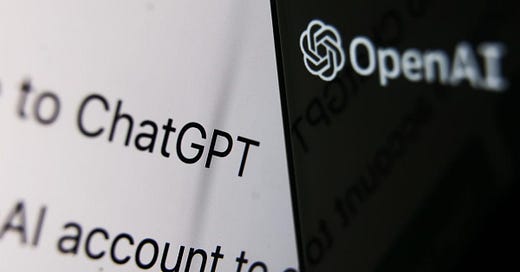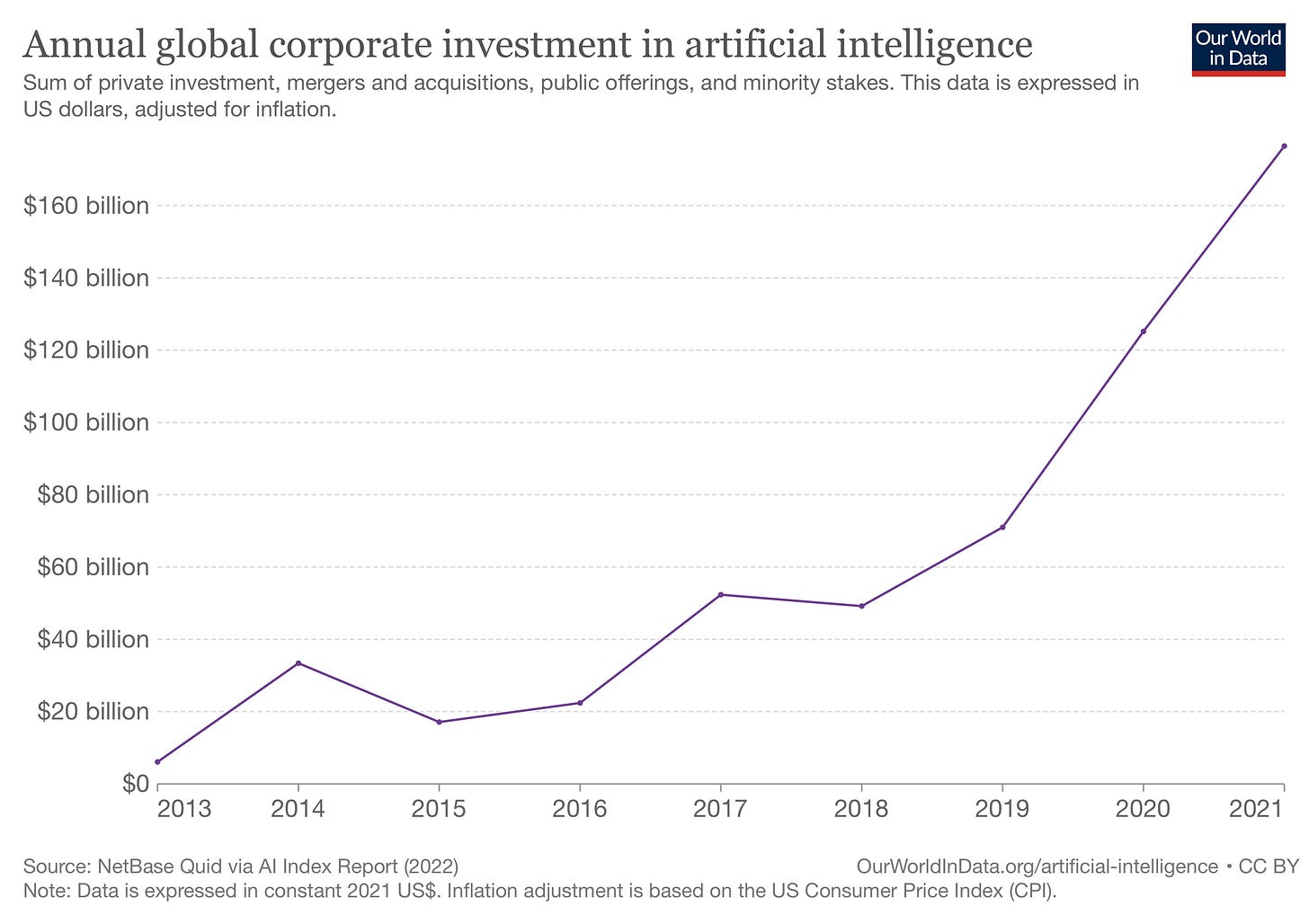OpenAI's $29 Billion Valuation In A Revolutionizing Industry
The exponential growth of AI investments, ChatGPT's popularity, OpenAI's ridiculous valuation and Hawking's warnings.
Hey there Zedites,
On the 11th of December, 2015, Elon Musk, Ilya Sutskever, Greg Brockman (former CTO of Stripe), Wojciech Zaremba and Sam Altman (former President of Y Combinator) founded a nonprofit organization to develop and popularize friendly Artificial Intelligence for the betterment of humanity as a whole, thus giving birth to OpenAI - the creator of the in-trend chatbot, ChatGPT.
A Story For You
“I think we should be very careful about artificial intelligence. If I had to guess at what our biggest existential threat is, it’s probably that. So we need to be very careful,” said Musk.
(Credits: The Guardian)
This is an excerpt from an article that dates back to 2014. OpenAI was created just a year later. That’s right Elon, don’t let them know what your next move is.
The idea behind OpenAI is simple - to expand the possibilities of using AI in order to make long-term contributions to our lives and in the process, not end the human race altogether. The investor bandwagon of the San Francisco-based startup, in addition to Musk, Brockman and Altman, include Reid Hoffman (Co-founder of LinkedIn), Peter Thiel (Co-founder of PayPal), Jessica Livingston (Founding member of Y Combinator), Khosla Ventures, Microsoft, Sequoia Capital, Khosla Venture, Tiger Global Management and some more.
Although Elon Musk backed out of the altruistic artificial intelligence venture citing conflict with Tesla in 2018, he continues to be a donor and a strong advisor for its board. Even without Musk, that’s quite the backing and support OpenAI has and it just goes to show how many heavy-pocketed investors have been dazzled by the lucrativeness of AI.
The Rise Of Artificial Intelligence
SoftBank Group - Masayoshi Son has pledged $28 billion of the $98 billion SoftBank Vision Fund to investments in AI, devoting 90% of his ‘own time and intellect’ on AI-based research.
Intel Capital - The mergers, acquisitions and investment arm of Intel Corporation invested $132 million in 11 startups, focused on AI, machine learning and autonomous computing in 2020 alone.
Andreessen Horowitz - A venture capital company, whose slogan is ‘Software is devouring the world’, has raised $7 billion over 7 funds dedicated to innovative entrepreneurs, advocating the loudest for AI.
Sequoia Capital - Investing in more than 52 VC rounds in 2020 alone, Sequoia Capital attributed the most amount of resources in AI-based startups.
And the list goes on.
OpenAI & ChatGPT
In 2019, the internal dynamics of OpenAI changed. It needed additional funds to sustain its mission and with the number of AI-based startups on the rise, VC funds, angel investors or HNIs needed an incentive to put their hard-earned money into OpenAI. Unable to strike the right balance between a nonprofit and a for-profit organization, it created a hybrid - OpenAI LP, a ‘capped profit’ company that enabled investors to gain 100x of their principal amount; the rest would obviously go to the works of the nonprofit entity.
Lo and behold, in the same year, Microsoft invested $1 billion, becoming their exclusive cloud provider, edging out Google’s DeepMind AI company. The incoming investment allowed for research and deployment of products that created quite a dent in how we, as humans, functioned.
OpenAI created a prevailing buzz in the media with the launch of ChatGPT in the recent past, allowing its previous products to surface in the hubbub as well.
ChatGPT is a large language model chatbot developed by OpenAI based on GPT-3.5. It has a remarkable ability to interact in conversational dialogue form and provide responses that can appear surprisingly human.
(Credits: Search Engine Journal)
Unlike Google, which leads you to pages where you can find an answer to your question or information in general, ChatGPT enters into a dialogue with you. It’s like conversing with a know-it-all friend that will not only answer your questions, but provide you with information, correct your codes, write essays for you and help you in numerous other ways.
The product isn’t perfect, churning out incorrect answers and repeating similar phrases at times but it’s a good start to what could be a potential replacement for Google. We didn’t like the first versions of Instagram, Snapchat and Facebook either right?

Launched on the 30th of November, 2022, ChatGPT went viral, amassing more than a million users, in just 5 days, with some users describing the only limitation being people’s imagination. And just for the purpose of context, it took Netflix 41 months, Twitter 24 months, Facebook 10 months, Dropbox 7 months, Spotify 5 months and Instagram 2.5 months to reach the same milestone.
As a matter of fact, it’s not the first time that OpenAI has launched a product that caught people’s attention. In January 2021, it announced Dall.E 2, an AI system that spat out realistic images with the help of natural language alone.

OpenAI is far from filling for an IPO but what can be gathered from what’s happening behind closed doors, is that it’s likely to change the landscape of technology in the near future.
The Investment Hype
OpenAI is in talks with venture-capital firms, billionaire business Joshua Kushner-founded Thrive Capital and existing investor Peter Thiel-founded Founders Fund, to sell existing shares worth $300 million in a tender offer, at a valuation of $29 billion. The deal would be structured in a way where incoming investors would be buying shares from current shareholders such as the employees of the company.
A tender offer often occurs when an investor proposes buying shares from every shareholder of a publicly traded company for a certain price at a certain time. The investor normally offers a higher price per share than the company’s stock price, providing shareholders a greater incentive to sell their shares.
Most tender offers are made at a specified price that represents a significant premium over the current share price. A tender offer might, for instance, be made to purchase outstanding stock shares for $18 a share when the current market price is only $15 a share. The reason for offering the premium is to induce a large number of shareholders to sell their shares. In the case of a takeover attempt, the tender may be conditional on the prospective buyer being able to obtain a certain amount of shares, such as a sufficient number of shares to constitute a controlling interest in the company.
(Credits: Investopedia)
For a company that ended the previous year with a revenue of $80 million and a valuation of $20 billion, that’s a significant leap! In their latest pitch to investors, OpenAI and Altman projected this year’s revenue to touch $200 million and $1 billion in 2024. The ‘how’ of it all remains bleak but reports have suggested that they’re going to start charging users for their products and services very soon.
The Warning Signs
There remain several questions on the safety of AI given that notable personalities have warned those who’ve dared to put their hands in it. It’s a path that needs to be tread on carefully.
“You’re probably not an evil ant-hater who steps on ants out of malice, but if you’re in charge of a hydroelectric green-energy project and there’s an anthill in the region to be flooded, too bad for the ants. Let’s not place humanity in the position of those ants.”
“It will either be the best thing that’s ever happened to us, or it will be the worst thing. If we’re not careful, it very well may be the last thing.” - Stephen Hawking
Stephen Hawking was cautious of Artificial Intelligence, even back then. Citing that AI is adept at accomplishing its goals, he feared humans getting its way and asking for trouble. Well, if that’s true, Sophia might not be wrong after all.
"This is a good start for my plan to dominate the human race." - Sophia
Even if that’s a joke, it’s creepy.
A Story From You
The investments in AI, the outlook towards it and the innovations in the field are definitely not slowing down. Money is being pumped into something that’s been touted the future, even without a viable product in hand sometimes.
What are your thoughts on artificial intelligence and do you think it’s the right way to look at the future?
See ya,
Aamer





